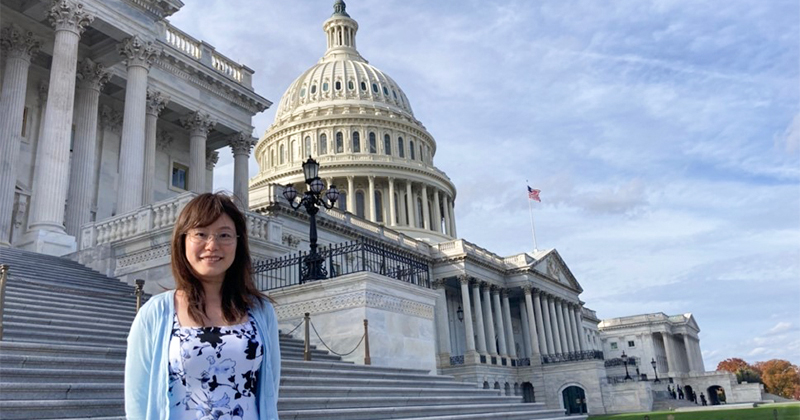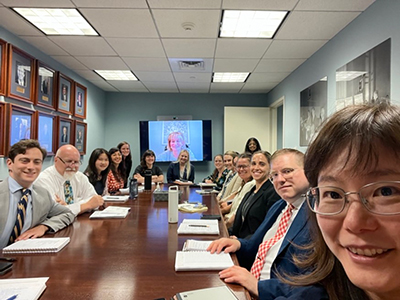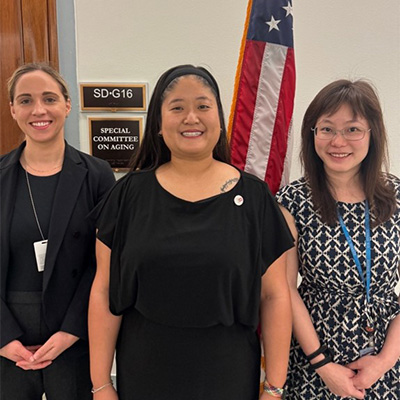Purdue Nursing researcher shapes health policy through Health and Aging Policy Fellowship Program in Washington, D.C.
Written By: Rebecca Hoffa, rhoffa@purdue.edu

Marian Liu stands on the steps in front of the U.S. Capitol.(Photo provided)
From health insurance to public health initiatives to nutrition regulations, health policy plays an important role in Americans’ lives every day. Marian Liu, associate professor in the Purdue University School of Nursing, has gotten firsthand experience in shaping policy through the 2023-24 Health and Aging Policy Fellows Program, which she began in fall 2023.
“It has been an amazing experience,” Liu said. “I do not have any policy background in my PhD training, so the fact that I’m able to be here in Washington, D.C., for a year in a very immersive environment to learn about the legislative processes on the Hill and then later transition to the executive branch to see how regulations are implemented is a very eye-opening and very humbling experience.”
Although she didn’t have much policy experience prior to joining the fellowship program, Liu’s research in elder justice issues, including abuse, neglect and exploitation of older adults, lies at the heart of a significant amount of policy work happening in the United States that aims to improve outcomes for this growing population. As Liu has advanced her research in working with Adult Protective Services, she has seen the value of the policy knowledge and leadership skills she is acquiring in the fellowship.

Liu (right) takes a photo with staffers on the United States Senate Special Committee on Aging.(Photo provided)
“Adult Protective Services programs in various states started asking me for policy recommendations, and I can talk about what I think would be good to do from a research perspective based on data, but I also understand in my interactions with some of the programs, whenever I start with ‘It depends,” I lose my audience’s interest,” Liu said. “I am definitely here to learn about how to communicate with the different audiences — not just academics but also my community partners and policy decision-makers.”
As a full-time residential fellow in Washington, D.C., Liu serves on the United States Senate Special Committee on Aging as part of the Medicare/Medicaid team, which also functions as the healthcare policy team for Sen. Bob Casey, who chairs the committee. In the role, she’s gotten the opportunity to see how collaborations happen across parties in the legislative branch and how legislation is developed. The hands-on experience has allowed Liu to not only read the literature and collaborate with staffers but also put together memos to inform Casey’s decisions.
So far, Liu has been part of work on full committee hearings, including the Assisted Living Facilities: Understanding Long-Term Care Options for Older Adults hearing and the Long-Term Care Workforce: Addressing Shortages and Improving the Profession hearing. She also worked on supporting bills, including the Cutting Copays Act and the Inflation Reduction Act.
“The aging committee really is the most collaborative committee on the Hill. While the Aging Committee doesn’t have a specific jurisdiction, it means that we can work on very difficult issues that none of the committees on the Hill have jurisdiction to tackle,” Liu said. “It’s a really exciting collaboration across the aisle.”
Liu has been part of the legislative branch since January, and she will conclude her fellowship with experience in the executive branch starting this summer. She will get to see what happens to the work once it leaves the legislative branch, giving her a well-rounded policy experience.

Liu (right) poses with Anna Foster (middle), a former Purdue School of Nursing PhD student, during a Special Committee on Aging meeting. (Photo provided)
“With this overall experience to work in the legislative and the executive branches, I feel like I will be able to see the different pieces of various legislations and regulations and how the staffers think about what’s needed for the country,” Liu said. “It’s very inspiring working on the Hill to interact with the staffers because they work so hard, and they are one of the smartest groups of people I have encountered.”
After the fellowship’s conclusion in September, Liu will begin her sabbatical from the College of Health and Human Sciences, during which she will participate in an extended fellowship period with the Centers for Medicare and Medicaid Services. In this experience, she will broaden her research to connect the elder justice issues she’s been researching with Medicare and Medicaid policies by exploring national Medicare and Medicaid data.
Liu noted elder justice researchers have yet to be able to explore Medicare data in-depth, so this distinct experience will allow her to not only broaden and elevate her research scope, but also help her hone the real-world impacts of her work.
“I know the fellowship is going to change how I approach research in general,” Liu said. “There are definitely still basic scientific questions I’m interested in answering. However, I think from now on, I would love to continue having that connection with people working in D.C., whether it’s in the legislative branch or the executive branch to understand how the research that I do would actually have a real-world impact.”
Discover more from News | College of Health and Human Sciences
Subscribe to get the latest posts sent to your email.